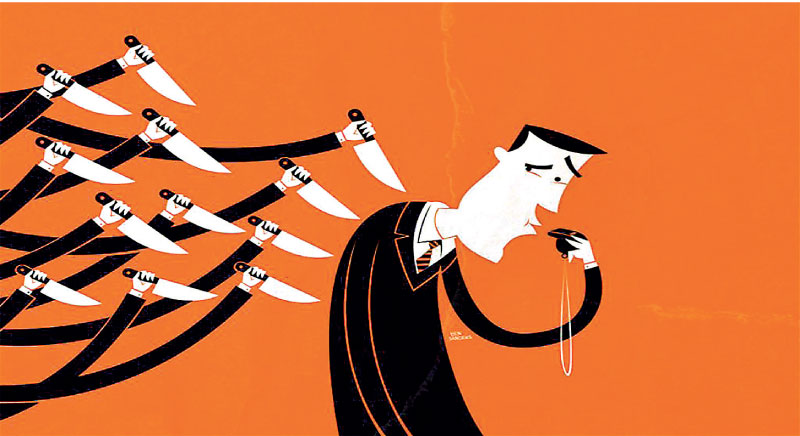Saturday Feb 21, 2026
Saturday Feb 21, 2026
Monday, 23 May 2022 02:06 - - {{hitsCtrl.values.hits}}

Whistle-blowing is a good thing to improve fair practices in banks. But in Sri Lanka, there is no official or legal protection for whistle-blowers
 Whistle-blowing refers to the disclosure by organisation members of illegal, immoral, or illegitimate practices under the control of their employers, to persons or organisations that may be able to effect action. It is the act of informing people in authority or the public that the company they work for is doing something wrong or illegal.
Whistle-blowing refers to the disclosure by organisation members of illegal, immoral, or illegitimate practices under the control of their employers, to persons or organisations that may be able to effect action. It is the act of informing people in authority or the public that the company they work for is doing something wrong or illegal.
In simple terms, whistle-blowing functions as a channel for reporting misconduct, fraudulent activities and all sorts of illicit or unethical practices within an organisation to internal and external parties. It is a crucial mechanism in the pursuit of better corporate governance specially in banking institutions which have a wider public obligation with a diverse set of stakeholders compared to non-bank organisations. Corporate misconduct was identified as one of the primary reasons for the financial and economic crisis that happened throughout the world. Sri Lanka also has experienced instability in the financial system due to weak governance practices that had taken place in commercial banks.
Basel Committee on Bank Supervision (BCBS), which is an international standard setting organisation for banks, has recognised the critical importance of timely escalation of problems to higher levels within banks. According to BCBS, employees should be encouraged and made able to communicate, confidentially and without the risk of reprisal, legitimate concerns about illegal, unethical or questionable practices. In this regard, a well-communicated whistle-blowing policy and adequate procedures and processes, consistent with national law need to be in practice. In line with this, the Legal and Compliance Department of the Central Bank of Sri Lanka has introduced a whistle-blowing policy in 2015. Whilst there are a number of international and national approaches, policies and procedures for effective employee whistle-blowing in banks, an important questions remains on its actual practice towards instilling good governance in these institutions.
Given this importance of whistle blowing in banks, this article gives a glimpse on the realities of whistle blowing practices in Sri Lankan banks through the accounts of several bankers of private and public establishments. As identified through these bankers’ views, employee whistle-blowing is not effectively implemented in banks due to social, cultural and legal factors. An experienced banker opined on the effective implementation of whistle-blowing in banks: “To know how effective the compliances are, banks should have a solid system for whistle-blowers. Nobody should know who blew the whistle. If it is revealed, it means that the policy is not strong. If there is no encouragement, then they will just have the policy, and that’s all. It will not work in practice.”
In general, whistle-blowing is discouraged in banks. The anonymity of the whistleblower is not protected. Another banker commented: “Whistle-blowing sometimes goes against the whistleblower. The anonymity of the subject is not protected sufficiently. If the protection is thereby law, then I think there will be more people coming forward. Then, more manipulations and misuse of resources will go into the public domain as well.” Talking from the experience, another banker mentioned: “There is a whistle-blowing policy in my bank. However, recently one of our chief officers was removed for blowing the whistle. He was interdicted.”
While appraising whistle-blowing as a mechanism that could be used to stimulate good corporate governance practices, many bankers are in the view that the whistle-blowing practice is discouraged due to high personal cost and weak legal protection available for whistle-blowers: “Whistle-blowing is a good thing to improve fair practices in banks. But in Sri Lanka, there is no official or legal protection for whistle-blowers. Because of that, those people who blew the whistle have done that at a great personal cost to themselves.”
‘Complaining’ is regarded as a whistle-blowing practice that arises from external parties such as depositors and the general public. However, public complaints remains at a low level which has a direct impact on bank service development. Opportunistic behaviours of bank managers and board members could further be triggered due to the weak public pressure on bankers’ misconduct: “Complaining is kind of a whistle-blowing and so it is important for improving the service also. But it is not happening. Consumers are not much powerful enough in the country.” Insufficient, inaccurate, and biased information on bank performance also contribute to weakening the whistle-blowing.
Information disseminated through corporate reports and media conceal the real picture of bank affairs. This is due to the weak media freedom of the country triggered by the dependence of newspapers on government advertising: “Newspapers are watchdogs. But are these watchdogs barking? They are not. Media is dependent on advertising they get from banks and the government. They report in favour of them. There is no pressure for banks in continuing their wrong practices.”
Banks as wet agencies are highly vulnerable for corruptions and alleged practices due to their money making ability. As to interviewees’ claims, employees do not stand up against unethical practices due to the high personal costs involved such as losing their jobs. This is manifested when a banker cited: “Whistle-blowing is there as a process. But it is not effective because of the fear of the people.” As was evident, a weak and discouraged whistle-blowing process increases the presence of opportunistic managerial behaviours in banks.
It is also worthwhile to look at the impact of embedded cultural values and attitudes in the Sri Lankan context and its impact on the whistle-blowing practices of banks. Specific identities in the country’s cultural spheres had contributed to the clientelistic political behaviour in banks. Influence of cultural characteristics in terms of: respect and recognition, uncertainty avoidance, and power distance have been instrumental in creating a clientelistic bond between a superior and an inferior or between a patron and a client. These clientelistic bonds developed to cope with uncertainty and are preferred in the high uncertainty avoidance culture as in Sri Lanka, which then acts as a barrier to the effective implementation of whistle-blowing.
Besides, lifetime employment which is dearly valued is a concern to whistle-blowers. As mentioned by another banker; “People do fear to blow the whistle against unfair practices, as they dearly love the job at the bank.” It is evident that in a high power distance cultures with more tolerance for inequality, being quiet is preferred over the voice. As mentioned by a manager in a bank, “Here the culture is that people very rarely challenge their bosses even if the boss is wrong.” Thus, these clientelistic practices in banking and related institutions reflect the impact of cultural attitudes and cohesiveness in the context on whistle-blowing practices.
However, it was also evident that employees tend to rely with certain groups such as employee unions to indirectly blow the whistle. As mentioned by a bank union officer: “Bank employees come to us (employee union) to blow the whistle. They are scared of losing their jobs for complaining. So we talk on behalf of them and assure that he is protected.” Being a member of the employee union is viewed as a safety net, even for top managers.
Speaking from his experience, a manager recalls the union support in reappointing his colleague who was interdicted as a result of political victimisation: “The pressure from the government for the top management is massive. Employee union plays a role in between to stop these influences. In one such case, the union was involved and resolved the issue.” It was the view of the participants that the affiliation with employee union gives protection for employee in whistle-blowing’ employees. Social groups are influential in banks and are beneficial for members in the given politicised environment. Views expressed by another participant indicated the union’s role as a voice in the employee-whistle-blowing process: “We have had enough cases of whistle-blowing through employee union.” Such group relationships have a deep concern over members’ welfare and getting equal treatments.
As the concluding remarks, whistle-blowing has proved to be a useful tool in exposing wrongdoing in banks, yet the cultural factors, weak institutions, clientelism and weak legal protection constitute a huge hindrance for the potential whistle-blowers in banking institutions. Whilst there is enormous room for the development of effective whistle-blowing practices in banks, it is first expected that the country need a unified law on whistle-blowing in order to ensure uniformity and certainly the protection of whistle-blowing-employees.
Finally, this review concludes that: (i) the employees play a critical role in preventing and exposing unethical practices in banks, (ii) personal relationships and trust building matters in whistle-blowing in banks given the cultural and political attributes of the context and (iii) policymakers have a critical role in strengthening the judiciary towards promoting whistle-blowing and protecting whistle-blowers from victimisation in banking institutions with a view to instil a better governance; a timely need.
(The writer is a Senior Lecturer in Banking and Finance, Faculty of Management and Finance, University of Colombo. She can be reached via [email protected].)